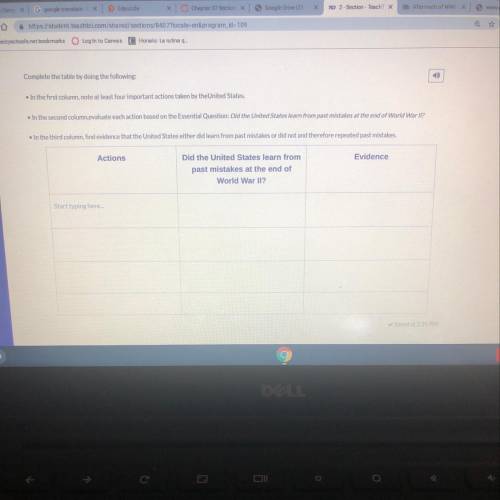Complete the table by doing the following:
• In the first column, note at least four important...

History, 20.03.2020 00:19 diamondgray2003
Complete the table by doing the following:
• In the first column, note at least four important actions taken by the United States.
• In the second column, evaluate each action based on the Essential Question: Did the United States learn from past mistakes at the end of World War II?
• In the third column, find evidence that the United States either did learn from past mistakes or did not and therefore repeated past mistakes.
Actions
Evidence
Did the United States learn from
past mistakes at the end of
World War II?


Answers: 2


Another question on History

History, 21.06.2019 19:10
30 ! seneca falls: common ground by andrea brecheen the seneca falls convention of 1848 was the single-most important event of the early women's suffrage movement. the suffrage movement grew out of centuries of shameful and unfair treatment of women. at the time of the convention, women did not have the right to vote or serve on juries, and many women were unable to inherit property. in the decades leading up to the convention, a small group of women began to rebel against these injustices. suffrage originated from women's participation in the anti-slavery and temperance movements. the seneca falls convention was the first conference dedicated to women's rights. the convention was organized by two female abolitionists, elizabeth cady stanton and lucretia mott. lucretia mott was an eloquent quaker social reformer. mott had previously been denied the right to speak at an anti-slavery conference in london after the men voted to exclude women from participating. unlike many women of her time, elizabeth cady stanton received a formal education. at the age of 16, stanton studied mathematics, latin, and greek, demonstrating her keen abilities by mastering the subjects alongside boys of her own age. coming together to support the suffrage movement, mott and stanton organized the convention in seneca falls, ny in july of 1848. during the six-day meeting, stanton presented the declaration of sentiments, a document she based on the declaration of independence. in the declaration, she so elegantly wrote, "we hold these truths to be self-evident: that all men and women are created equal." the declaration included a list of grievances detailing the treatment of women. the declaration was signed by sixty-eight women and thirty-two men. following the convention, in 1848 the new york state assembly passed the married women's act. this act protected property that women brought into or earned during marriage. read the passage. which sentence best represents a fact about elizabeth cady stanton detailed in the text? a "unlike many women of her time, elizabeth cady stanton received a formal education." b "in the declaration, she so elegantly wrote, 'we hold these truths to be self-evident: that all men and women are created equal.'" c "stanton rightly believed it should the law should be changed to make it easier for women to get divorces and keep their access to their children." d "at the age of 16, stanton studied mathematics, latin, and greek, demonstrating her keen abilities by mastering the subjects alongside boys of her own age."
Answers: 2

History, 21.06.2019 19:30
Which sentence best describes the effect of the articles of confederation on the government
Answers: 3

History, 22.06.2019 07:00
With state which alliance promoted goals and protection of the united states and which alliance promoted goals and protection of the soviet union. site and explain evidence from each primary source to support your answers.
Answers: 1

History, 22.06.2019 07:00
Imagine that you have completed your paper. the following are two paragraphs you have written that contain direct quotations from your sources. below each paragraph is the source used. for each source, use mla style to create the correct in-text citation and place it in the correct place within the paragraph. gandhi did not grow up wealthy. of his family, he recalled, “my father never had any ambition to accumulate riches and left us very little property. he had no education, save that of experience.” like his father, gandhi became someone who valued experience over money. the quotation is taken from page 2 of this source: gandhi, mahatma. the story of my experiments with truth. 1927. new york: dover publications, 1983. print. gandhi’s experiences abroad taught him a great deal, but they certainly did not make him rich. according to indian scholar e.s. reddy, “…on january 9, 1915, m. k. gandhi returned to bombay after 21 years in exile, wearing a loin cloth and travelling from london in the lowest class of the ship.” few people suspected that this unassuming man would become one of the most powerful and beloved leaders in history. the quotation is taken from page 1 of this source: reddy, e.s. gandhi’s vision of a free south africa. hyderabad, india: sangam books, ltd. 1995. print.
Answers: 1
You know the right answer?
Questions


Biology, 03.02.2020 05:03

Biology, 03.02.2020 05:03


Biology, 03.02.2020 05:04

Spanish, 03.02.2020 05:04

English, 03.02.2020 05:04

Mathematics, 03.02.2020 05:04

Mathematics, 03.02.2020 05:04


History, 03.02.2020 05:04

Chemistry, 03.02.2020 05:04


History, 03.02.2020 05:04

Mathematics, 03.02.2020 05:04


Computers and Technology, 03.02.2020 05:04


Biology, 03.02.2020 05:04

History, 03.02.2020 05:04



